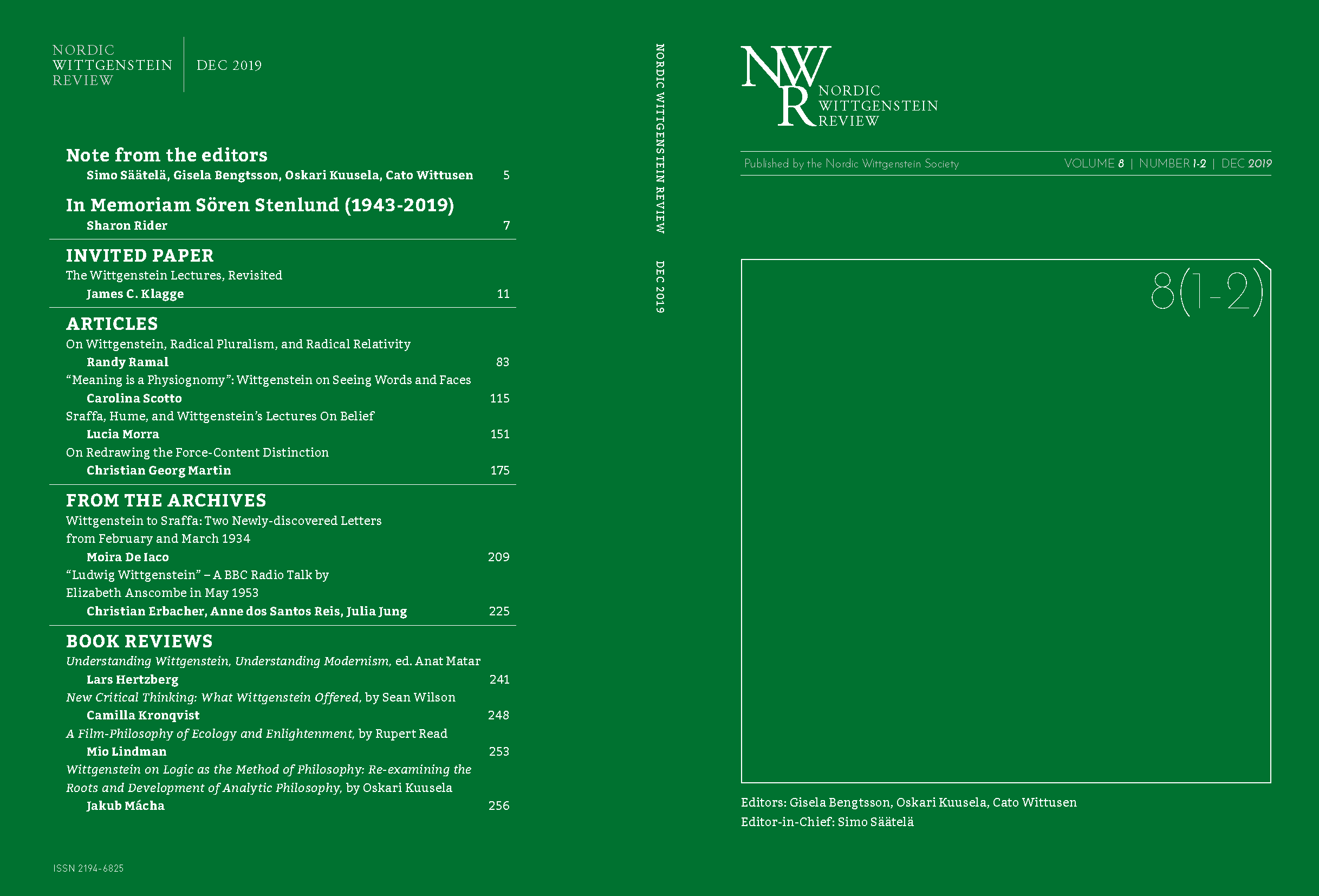On Redrawing the Force-Content Distinction
DOI:
https://doi.org/10.15845/nwr.v8i1-2.3531Keywords:
force-content distinction, Frege-Geach point, Frege, Wittgenstein, Bronzo, Kimhi, RödlAbstract
Frege distinguished the thought qua logical content from the assertoric force attached to it when judged to be true. The gist of this distinction is captured by the so-called Frege-Geach point. Recently, several authors have drawn inspiration from Wittgenstein to reject this point and the distinction it is based on. This article proceeds from the observation that Wittgenstein himself did not reject the force-content distinction but urged us to reformulate it in a non-dualistic way. While drawing on Wittgensteinian lessons about thought and its expression, the overall purpose of this paper is systematic, not exegetic: it seeks to contribute to the contemporary debate aboute force and content by arguing that this distinction should be redrawn in such a way as to exhibit force as internal to thought, namely, as that which provides for the unity of thought. To this end, it is investigated what it is for a thought to occur as a forceless part of a propositionally complex assertion (e. g. for p to occur as a part of the assertion that not p).
References
Barker, S., 2004. Renewing Meaning: A Speech-Act Theoretic Approach. Oxford: Clarendon Press.
Bronzo, S., 2018. “Propositional Complexity and the Frege-Geach Point“. <https://silverbronzo.files.wordpress.com/2018/08/bronzo-propositional-complexity-and-the-frege-geach-point-11-june-2018.pdf> (accessed Feb. 20, 2019).
Dummett, M., 1994. Origins of Analytical Philosophy. Cambridge, MA: Harvard University Press.
Frege, G., 1963. “Compound Thoughts“, trans. R. Stoothoff. Mind 72, pp. 1-17. (= CT)
Frege, G., 1979. “Introduction to Logic“. In: Posthumous Writings, trans. P. Long and R. White. Oxford: Blackwell, pp. 185-196. (= IL)
Frege, G., 1997a. „Thought“, trans. P. Geach and R. Stoothoff. In: M. Beaney, ed., The Frege Reader. Oxford: Blackwell, pp. 325-345. (= T)
Frege, G., 1997b. “Negation“, trans. P. Geach. In: M. Beaney, ed., The Frege Reader. Oxford: Blackwell, pp. 346-367. (= N)
Frege, G., 1997b. “Begriffsschrift“, trans. M. Beaney. In: M. Beaney, ed., The Frege Reader. Oxford: Blackwell, pp. 47-78. (= CS)
Frege, G., 1997c. “Function and Concept“, trans. P. Geach. In: M. Beaney, ed., The Frege Reader. Oxford: Blackwell, pp. 130-148. (= FC)
Geach, P., 1965. “Assertion“. The Philosophical Review 74, pp. 449-465.
Geach, P., 1979. “Kinds of Statement“. In: C. Diamond and J. Teichman, eds., Intention and Intentionality: Essays in Honour of G. E. M. Anscombe. Brighton: Harvester Press, pp. 221-235.
Hanks, P., 2015. Propositional Content. Oxford: Oxford University Press.
Hanks, P., 2016. “On Cancellation“. Synthese, https://doi.org/10.1007/s11229-016-1260-4.
Kimhi, I., 2018. Thinking and Being. Cambridge, MA: Harvard University Press.
Recanati, F., 2013. “Content, Mood, and Force“. Philosophy Compass 8, pp. 622-632.
Recanati, F., 2016. “Force Cancellation“. Synthese, https://doi.org/10.1007/s11229-016-1223-9
Rödl, S., 2018. Self-Consciousness and Objectivity. An Introduction to Absolute Idealism. Cambridge, MA: Harvard University Press.
Russell, B., 1990. The Philosophy of Logical Atomism. La Salle, IL: Open Court.
Wittgenstein, L., 1958. The Blue and Brown Books. Oxford: Blackwell. (= BB)
Wittgenstein, L., 1958b. Philosophical Investigations, trans. G. E. M. Anscombe. Oxford: Blackwell. (= PI)
Wittgenstein, L., 1994. Tractatus Logico-Philosophicus, trans. D. Pears and B. F. McGuiness. London: Routledge. (= TLP)
Wittgenstein, L., 2005. The Big Typescript: TS 213, trans. C. G. Luckhardt and M. A. E. Aue. Malden, MA: Blackwell Publishing. (= BT)
Downloads
Published
How to Cite
Issue
Section
License
Copyright (c) 2019 Christian Martin

This work is licensed under a Creative Commons Attribution 4.0 International License.
NWR uses the Creative Commons license CC-BY.
Vol. 1-3 used CC-BY-NC-SA. The collected works copyright ownership for Vol. 1-2 were shared by Nordic Wittgenstein Society and ontos Verlag/De Gruyter.








